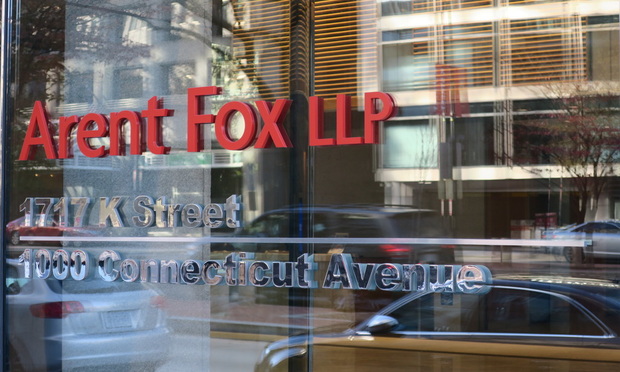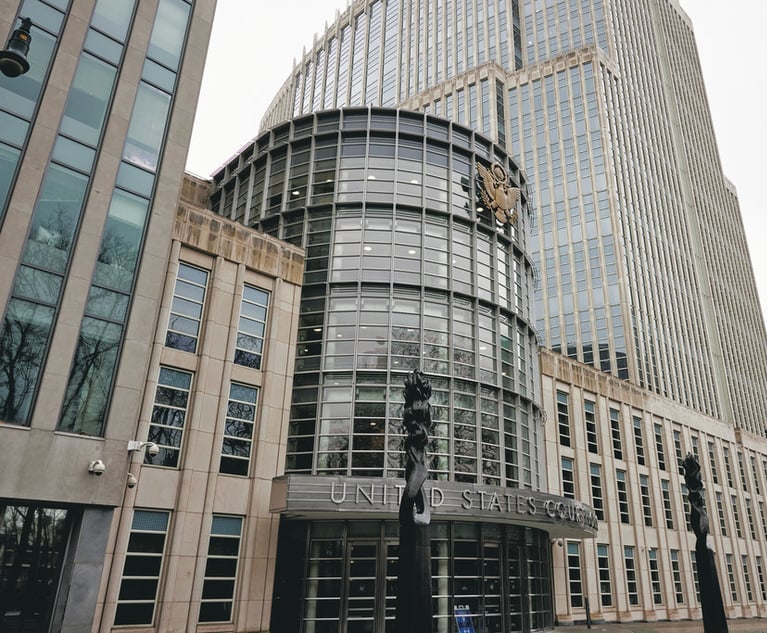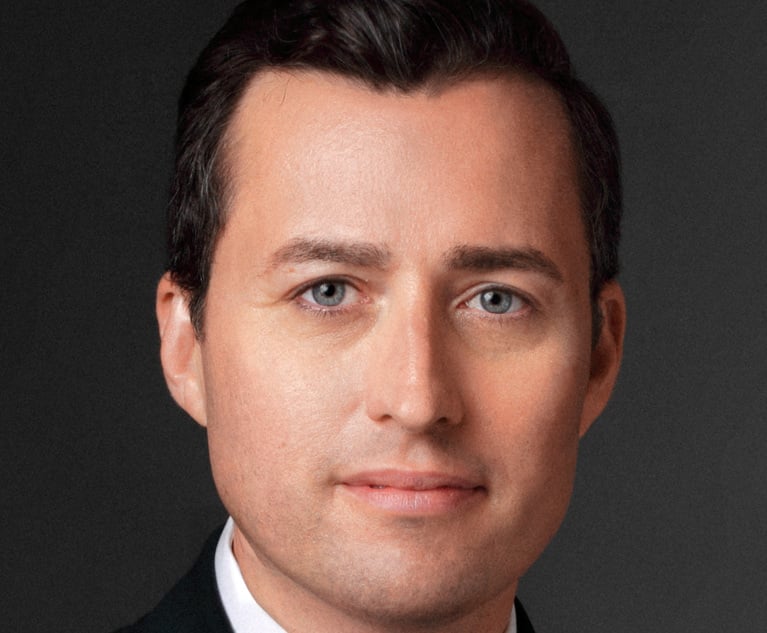Life Insurance Funder's $6M Arent Fox Malpractice Suit Heads to Trial
A federal judge said the evidence didn't clearly favor either side in a life insurance premium finance company's malpractice suit against Arent Fox.
April 03, 2019 at 11:15 AM
3 minute read
 Arent Fox office in Washington, D.C. Photo by Diego Radzinschi/ALM
Arent Fox office in Washington, D.C. Photo by Diego Radzinschi/ALM
A $6 million legal malpractice case brought by a life insurance policy investor against Arent Fox and one of its partners is headed to trial after a federal judge mostly rejected efforts by both sides to clarify whether the firm had made an error.
Windsor Securities, which lent money to several trusts so they could take out life insurance policies for elderly people that would serve as collateral for the loans, said the firm and its partner, Julius Rousseau, gave bad advice that resulted in its efforts to collect under the policies being disputed. Windsor ended up switching lawyers and inking settlements, but said Arent Fox and its lawyer are to blame for its losses.
Both sides sought summary judgment, but U.S. District Judge George Daniels of the Southern District of New York ruled on March 27 that neither side's evidence was enough to prevail on the main issue before him. He granted Arent Fox a win on claims worth $38,000, but the judge wrote that premium-finance and legal experts disagreed on key points related to negligence and whether Arent Fox and its lawyer were the proximate cause of Windsor's losses.
Two of Windsor's claims—for breach of contract and breach of fiduciary duty—were cut from the suit completely, with the judge saying they were duplicative of the malpractice claim.
According to Windsor, Rousseau told the company that once the funds it loaned to the trusts came due, it simply needed to file a change-of-ownership form with the life insurance companies for it to get its hands on the policies. That legal theory was tested, however, when John Bitter, one of the insureds, died, and the trustee that held his policy disputed Windsor's entitlement to the death benefits.
The policy disputes turned on the agreements between Windsor and the trusts and how section 9620 of the California Commercial Code bore on the transfer of the insurance policies. In the Bitter case, an arbitration panel faulted Windsor for not invoking the default sales right in its agreements with the trust, and the company says Rousseau was negligent to have missed it.
Alan Frank of Alan L. Frank Law Associates, who represents Windsor, said in an email that “over $6 million” in damages was still on the table.
Peter Wang, a partner at Foley & Lardner who represents the defendants, declined to comment.
This content has been archived. It is available through our partners, LexisNexis® and Bloomberg Law.
To view this content, please continue to their sites.
Not a Lexis Subscriber?
Subscribe Now
Not a Bloomberg Law Subscriber?
Subscribe Now
NOT FOR REPRINT
© 2025 ALM Global, LLC, All Rights Reserved. Request academic re-use from www.copyright.com. All other uses, submit a request to [email protected]. For more information visit Asset & Logo Licensing.
You Might Like
View All
Insurance Company Sues Over 180 Health Care Providers for Fraud Under RICO
3 minute read
New York Court of Appeals Tightens Pleading Standards Against Insurance Policyholder
7 minute read
Amid Growing Litigation Volume, Don't Expect UnitedHealthcare to Change Its Stripes After CEO's Killing
6 minute read
GE Agrees to $362.5M Deal to End Shareholder Claims Over Power, Insurance Risks
2 minute readTrending Stories
Who Got The Work
J. Brugh Lower of Gibbons has entered an appearance for industrial equipment supplier Devco Corporation in a pending trademark infringement lawsuit. The suit, accusing the defendant of selling knock-off Graco products, was filed Dec. 18 in New Jersey District Court by Rivkin Radler on behalf of Graco Inc. and Graco Minnesota. The case, assigned to U.S. District Judge Zahid N. Quraishi, is 3:24-cv-11294, Graco Inc. et al v. Devco Corporation.
Who Got The Work
Rebecca Maller-Stein and Kent A. Yalowitz of Arnold & Porter Kaye Scholer have entered their appearances for Hanaco Venture Capital and its executives, Lior Prosor and David Frankel, in a pending securities lawsuit. The action, filed on Dec. 24 in New York Southern District Court by Zell, Aron & Co. on behalf of Goldeneye Advisors, accuses the defendants of negligently and fraudulently managing the plaintiff's $1 million investment. The case, assigned to U.S. District Judge Vernon S. Broderick, is 1:24-cv-09918, Goldeneye Advisors, LLC v. Hanaco Venture Capital, Ltd. et al.
Who Got The Work
Attorneys from A&O Shearman has stepped in as defense counsel for Toronto-Dominion Bank and other defendants in a pending securities class action. The suit, filed Dec. 11 in New York Southern District Court by Bleichmar Fonti & Auld, accuses the defendants of concealing the bank's 'pervasive' deficiencies in regards to its compliance with the Bank Secrecy Act and the quality of its anti-money laundering controls. The case, assigned to U.S. District Judge Arun Subramanian, is 1:24-cv-09445, Gonzalez v. The Toronto-Dominion Bank et al.
Who Got The Work
Crown Castle International, a Pennsylvania company providing shared communications infrastructure, has turned to Luke D. Wolf of Gordon Rees Scully Mansukhani to fend off a pending breach-of-contract lawsuit. The court action, filed Nov. 25 in Michigan Eastern District Court by Hooper Hathaway PC on behalf of The Town Residences LLC, accuses Crown Castle of failing to transfer approximately $30,000 in utility payments from T-Mobile in breach of a roof-top lease and assignment agreement. The case, assigned to U.S. District Judge Susan K. Declercq, is 2:24-cv-13131, The Town Residences LLC v. T-Mobile US, Inc. et al.
Who Got The Work
Wilfred P. Coronato and Daniel M. Schwartz of McCarter & English have stepped in as defense counsel to Electrolux Home Products Inc. in a pending product liability lawsuit. The court action, filed Nov. 26 in New York Eastern District Court by Poulos Lopiccolo PC and Nagel Rice LLP on behalf of David Stern, alleges that the defendant's refrigerators’ drawers and shelving repeatedly break and fall apart within months after purchase. The case, assigned to U.S. District Judge Joan M. Azrack, is 2:24-cv-08204, Stern v. Electrolux Home Products, Inc.
Featured Firms
Law Offices of Gary Martin Hays & Associates, P.C.
(470) 294-1674
Law Offices of Mark E. Salomone
(857) 444-6468
Smith & Hassler
(713) 739-1250






